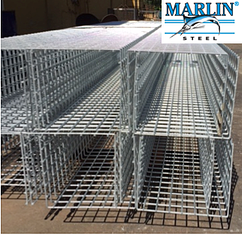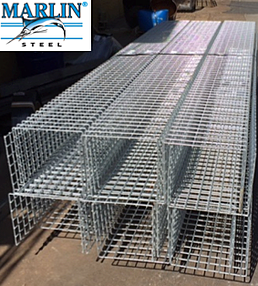Recently, Marlin Steel was contracted to make cable trays to bolt onto walls and ten-foot trays/baskets to carry electrical wire, computer cables, and other electronic components. Orders like these are Marlin Steel’s bread and butter: High precision custom metal forms to meet tight tolerances.
The kicker for this order? The parts being made in these baskets were for a nuclear power plant. Such power plants need ultra-high precision in their materials to ensure the greatest level of safety and operational efficiency possible.
On top of that, these parts needed to be made to a very tight schedule to keep construction of the plant on-time and prevent expensive delays.
Automation Rising to the Challenge
 To ensure that we can manufacture much-needed wire forms quickly and with the exacting consistency that high-precision applications demand, Marlin Steel has invested heavily in manufacturing automation. The manufacturing robots used by Marlin include:
To ensure that we can manufacture much-needed wire forms quickly and with the exacting consistency that high-precision applications demand, Marlin Steel has invested heavily in manufacturing automation. The manufacturing robots used by Marlin include:
- A Medium Frequency Direct Current Automated Welding Machine. This welder can complete welds in three dimensions with less flash and spatter than a traditional welding machine, and with incredible consistency since there are fewer heat stress deformities caused during the weld.
- Wire Bending Robots. Marlin Steel uses a small army of wire bending robots that can make precise bends of just the right angles at the right lengths. Even complicated compound bends can be made in multiple lengths of wire with incredible precision on a micrometer level.
- CNC Press Brake. When you want to have a perfectly done bend in a large piece of metal, such as a sheet metal tray, the CNC press brake is one of the best tools for the job. This machine applies several tons of force to a metal form to create a consistent, reliable bend.
Each of these machines is operated by a trained specialist, and once set up for a given job, can run for days on end, practically unattended.
Unlike manual labor, automated manufacturing equipment doesn’t get tired as the day goes on. If a wire bending robot can bend 20 pieces of wire a minute for a given job at the start of the day, it will still be working at that rate at the end of the day (that’s 9,600 pieces of wire in a single eight-hour shift per machine). Better yet, the machine will make the same precision bend at the same lengths and the same angles every time, keeping each custom wire form within micrometer precise tolerances.
This is something that would be virtually impossible to replicate with manual labor with anything close to the same efficiency and speed.
Because of the speed and consistency that manufacturing automation makes possible it is possible to take a production piece from concept to delivery in just a few weeks, rather than in months.
Designing the Right Custom Forms for the Job
 Of course, while the automated machines we use are incredibly fast and efficient, they still need to be set up, including being given a custom program for shaping the metal into a usable product. This is where the Marlin Steel team of robot operators and mechanical engineers comes in.
Of course, while the automated machines we use are incredibly fast and efficient, they still need to be set up, including being given a custom program for shaping the metal into a usable product. This is where the Marlin Steel team of robot operators and mechanical engineers comes in.
Mechanical engineers on the Marlin Steel team take a look at the designs of the existing materials handling baskets (if any), the parts to be held, and the environmental conditions and wash processes that each basket will be exposed to. Using this information, Marlin Steel’s degreed engineers either take the existing design, modify it, or create an entirely new design and run virtual simulations to see if the design will hold up under stress. If the stress of the basket’s daily use would cause movement in the frame of more than the width of a human hair, the design fails and the basket goes back to the drawing board.
This virtual simulation method saves an enormous amount of time and labor on tooling the machines, doing a test run, shipping the prototype to the client, and having them test it in their process for a day to see if it works. Instead, Marlin’s AutoDESK software can run a detailed analysis of the design and materials to see if the basket or tray would survive the process in a tiny fraction of the time.
Marlin’s degreed engineers can see why the basket failed the simulation, and create solutions to address the issue, whether that issue is that the baskets don’t have enough corrosion and heat resistance, or if the mesh isn’t being reinforced enough to take the weight of held objects.
Faster Delivery
Thanks to the speed at which automated machines can form and assemble metal objects, the quickness with which virtual simulations can eliminate faulty designs, and our ability to ship to other companies in the U.S. via truck delivery rather than having to wait for a cargo ship, Marlin Steel can provide incredibly fast delivery times to our American customers.
In fact, the job to make the parts handling and washing baskets for the nuclear plant job took only three weeks from start to finish. From the time the order was made, it took less than three weeks to design, build, and ship the baskets to the client. Orders from overseas competitors for commodity baskets spend more time than that just in the shipping phase waiting for an available cargo container.
Learn more about how Marlin Steel is bringing back the pride of the “Made in America” mark using advanced automation, forward thinking workplace training, and a commitment to quality engineered quick®!



.gif)


